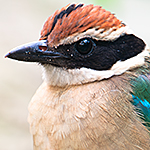Blue-rumped Pitta Hydrornis soror tonkinensis in Guangxi and douglasi endemic to Hainan. HABITAT & BEHAVIOR Various types of forest, above 900 m (2,950 ft.). Shy, easily overlooked. Mainly invertebrate diet typical of pittas. ID & COMPARISON Similar to Blue-naped Pitta H. nipalensis, but turquoise nape reaches further up crown, blue rump extends to back, and face is less buffy and sometimes has a lilac tinge. Has black stripe behind eye and dark lores (sometimes indistinct but more obvious than in Blue-naped Pitta). Upperparts olive-green; rump blue; uppertail coverts and tail brown to green. Underparts and wings rusty-brown. Females duller with more green on nape and with browner upperparts. Juvenile dark brown above, buffy below, with buff spots and streaking on head and upperparts. Breast unstreaked buff below. Juvenile Rusty-naped Pitta H. oatesi and Blue Pitta H. cyaneus have streaking on breast. BARE PARTS Bill grey; feet pink. VOICE Has two one-note calls: one explosive, the other more inflected and fluty. Song usually repeated at long intervals. — Craig Brelsford
THE PITTAS OF CHINA
shanghaibirding.com covers all species in China in the family Pittidae. Click any link:

Eared Pitta Hydrornis phayrei
Rusty-naped Pitta H. oatesi
Blue-naped Pitta H. nipalensis
Blue-rumped Pitta H. soror
Blue Pitta H. cyaneus
Blue-winged Pitta Pitta moluccensis
Hooded Pitta P. sordida
Fairy Pitta P. nympha
ACKNOWLEDGEMENTS
Daniel Bengtsson served as chief ornithological consultant for Craig Brelsford’s Photographic Field Guide to the Birds of China, from which this species description is drawn.
